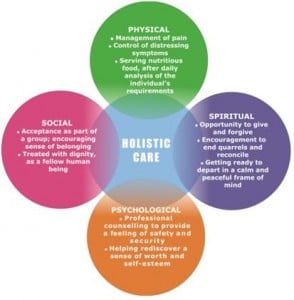
The Importance of Holistic Nursing Care: How to Completely Care for your Patients

The American Holistic Nurses Association defines holistic nursing as “all nursing practice that has healing the whole person as its goal.” This ideal of caring for the entire person, not just their physical body, is one that dates back to Florence Nightingale herself. Every nurse knows about Florence and her devotion to caring for those who could not care for themselves. Because she emphasized the connection between patients and their environment, she is considered one of the first holistic nurses. Nursing has come a long way since the days of Florence Nightingale and her pioneering actions that define her as “The Mother of Modern Nursing.” One thing that has not changed, and is unlikely to change anytime in the near future, is the presence of illness and its effect on people.
Illness has the power to strike down the mightiest of individuals; no one is immune. As nurses we must be knowledgeable about how diseases affect our patients. Due to the high patient load and often intense time constraints placed on nurses, it can be easy to simply treat the physical being and move on to the next patient, resident, or client. It is important to care for the whole person and to see them as just that; a whole person, not just a patient or diagnosis. Holistic nursing care involves healing the mind, body, and soul of our patients. It involves thinking about and assisting patients with the effects of illness on the body, mind, emotions, spirituality, religion, and personal relationships. Holistic care also involves taking into consideration social and cultural differences and preferences. Every person is their own individual. Shouldn't our care of each patient be individualized?
 Holism is more than certain actions performed or words spoken to a patient. Holistic care is a philosophy; it’s a method to ensure care for all parts of a patient. Holistic nurses are those that recognize and treat each individual differently. Holistic nurses are often described by patients as those nurses that “truly care.” While there is nothing inherently wrong with being task-oriented or goal-oriented in your nursing care, if a nurse is overly task-oriented or appears severely rushed, it can leave patients feeling like they are just a number or a diagnosis or worse, a burden. Every nurse is guilty of having to rush at some point; we all know the dilemma of too many patients and not enough time; too much charting and not enough time; too many family members to deal with and not enough time. Between things like patient needs, fellow nurses, doctors, charting, dealing with family members, and more, nurses have a lot to worry about. As nurses we must find a way to balance all of the duties and responsibilities that come with the title. Once we do this our duties and responsibilities become our privileges and success.
Holism is more than certain actions performed or words spoken to a patient. Holistic care is a philosophy; it’s a method to ensure care for all parts of a patient. Holistic nurses are those that recognize and treat each individual differently. Holistic nurses are often described by patients as those nurses that “truly care.” While there is nothing inherently wrong with being task-oriented or goal-oriented in your nursing care, if a nurse is overly task-oriented or appears severely rushed, it can leave patients feeling like they are just a number or a diagnosis or worse, a burden. Every nurse is guilty of having to rush at some point; we all know the dilemma of too many patients and not enough time; too much charting and not enough time; too many family members to deal with and not enough time. Between things like patient needs, fellow nurses, doctors, charting, dealing with family members, and more, nurses have a lot to worry about. As nurses we must find a way to balance all of the duties and responsibilities that come with the title. Once we do this our duties and responsibilities become our privileges and success.
As nurses we can not only use holistic nursing care to enrich the lives of our patients, but to enrich our own lives as well. Nursing is a tough profession. It is physically, mentally, and emotionally draining at times. Other times you experience a patient or moment that reminds you why you became a nurse. One way to increase these experiences and provide better overall care to our patients is through holistic nursing care. The key is not necessarily about how long you spent interacting with a patient, but how you used the time you had with them. Nurses should strive to always make the most of the short time they have with each patient. As nurses we need to promote a patients psychological and emotional wellbeing in order to facilitate physical healing. When we do this our relationship with the patient changes and grows into something more positive than before. This leads to better patient outcomes and can increase the happiness and purpose in your work as a nurse.
There are many easy ways to improve relationships with patients and promote a healthy psychological, emotional, and spiritual environment.
- Learn the patients name and use it
- Make good, strong eye contact
- Ask how a patient is feeling and sincerely care
- Smiling and laughing when appropriate
- Use therapeutic touch
- Assist the patient to see themselves as someone that deserves dignity
- Preserve their dignity
- Educate your patients on the importance of self-care
- Ask the patient how you can reduce their anxiety or pain
- Use non-pharmacological methods of pain control such as imagery, relaxation techniques, and more
- Encourage patients and assist as needed with alternative treatment modalities; never underestimate the benefit of a massage, aromatherapy, or music
- Ask if patients have certain religious, cultural, or spiritual beliefs; be sensitive and accepting if they do

This is a small list of changes that can be implemented in order to focus more on holistic care of your patients. At the end of the day holistic care is not even about how many holistic actions you performed. What matters is having the intention to care for each patient as a whole and being present for that patient while you can. Holistic nursing can be practiced in any healthcare setting.
For those highly interested in the concept of holistic nursing, there are special certifications and titles that can be obtained after a through education on the subject. the Journal of Holistic Nursing is a great resource and can be found online: http://jhn.sagepub.com/. Certifications from the American Holistic Nurse Certification Corporation (AHNCC - http://ahncc.org/) require an RN licensure or higher. However that does not mean LPN's cannot practice holistically. Any nurse is capable of holistic care. It is taught in many nursing schools across the country. Whether you are a seasoned holistic nurse or a newbie that wants to get involved, just focus on the patient-nurse relationship and encourage healing in whichever ways you are able… and remember: What would Florence do?
Related Articles
Featured Article





